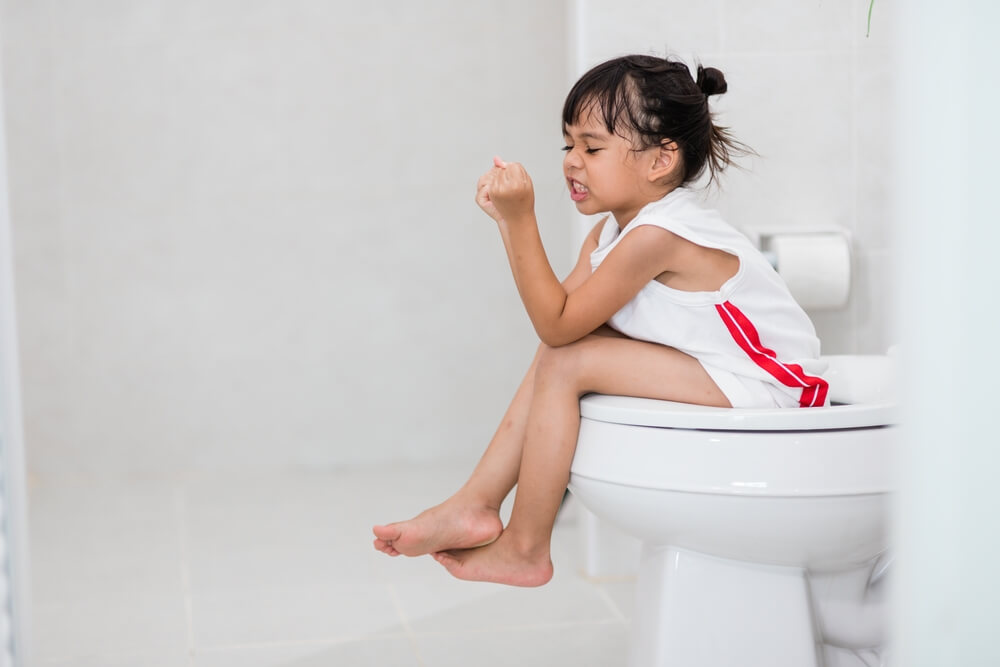Addressing constipation in kids is a common concern for parents, and understanding when to seek medical attention and implementing preventive measures is crucial for maintaining a child’s digestive health.
In this comprehensive guide, the seasoned team at Children’s Medical Center of South Florida will explore the signs of constipation in kids, discuss when it might be necessary to consult a doctor, and provide practical tips on preventing and managing pediatric constipation.
And if you still have any concerns after reading this article, consider scheduling a well-child check with our experts.
Recognizing Signs of Constipation in Kids

Constipation in kids can manifest in various ways, often leading to discomfort and concern for both children and their parents. Recognizing the signs is the first step in addressing this common digestive issue:
Infrequent Bowel Movements
One of the primary signs of constipation in kids is infrequent bowel movements. If your child is not having regular bowel movements, it may indicate constipation. However, it’s essential to consider what is normal for your child, as bowel habits can vary.
Hard or Painful Stools
Constipated children often pass hard, dry stools that can be painful to expel. If your child appears to be in discomfort or experiences pain during bowel movements, it could be a sign of constipation.
Straining During Bowel Movements
If your child consistently strains while trying to have a bowel movement, it may suggest constipation. Excessive straining can contribute to discomfort and may be a signal that the stool is too hard or large.
Abdominal Pain or Bloating
Constipation can cause abdominal pain or bloating in children. If your child complains of stomach discomfort or if you notice abdominal distension, it may be related to constipation.
Refusing to Use the Toilet
Some children, especially toddlers, might develop a fear of using the toilet if they associate it with pain or discomfort. This avoidance can contribute to constipation.
When to See a Doctor for Pediatric Constipation
While occasional constipation is common, persistent or severe constipation in children may require medical attention. It’s crucial to be aware of when to consult a doctor:
Persistent Symptoms
If your child consistently exhibits signs of constipation, such as infrequent bowel movements, over an extended period, it’s advisable to seek medical advice. Persistent symptoms could indicate an underlying issue that needs to be addressed.
Blood in Stool
If you notice blood in your child’s stool, it’s a red flag that requires immediate medical attention. Blood can indicate rectal fissures or other issues that need to be evaluated by a healthcare professional.
Weight Loss or Failure to Thrive
Severe constipation in children can sometimes lead to weight loss or failure to thrive. If you observe significant changes in your child’s weight or growth trajectory, consult a doctor promptly.
Recurrent Episodes
If your child experiences recurrent episodes of constipation, even after making dietary and lifestyle adjustments, it’s advisable to consult a healthcare professional. Recurring constipation may indicate an underlying issue that requires investigation.
Abdominal Pain or Vomiting
Persistent abdominal pain or vomiting associated with constipation can be signs of a more severe issue. These symptoms warrant prompt medical attention to rule out complications.
Preventing Constipation in Kids
Preventing constipation in kids is a proactive and essential aspect of promoting their overall well-being. By adopting a holistic approach that encompasses lifestyle and dietary habits, parents can play a pivotal role in supporting healthy digestion and preventing constipation in their children.
1. Fiber-Rich Diet
A cornerstone of preventing constipation is ensuring your child’s diet is rich in fiber. Incorporate a variety of fiber sources into their meals, including fruits, vegetables, whole grains, and legumes. These fiber-rich foods not only provide essential nutrients but also promote regular bowel movements by adding bulk to the stool. For breakfast, consider offering whole-grain cereals or oatmeal with fresh berries, and include a colorful array of vegetables with lunch and dinner to enhance fiber intake.
2. Hydration
Proper hydration is a key factor in preventing constipation. Encourage your child to drink plenty of water throughout the day. Water helps soften the stool, making it easier to pass. Make it a habit for your child to have a water bottle accessible, especially during activities or when spending time outdoors. Consider infusing water with natural flavors using slices of fruits like citrus or berries to make it more appealing to children.
3. Establish a Regular Toilet Routine
Establishing a regular toilet routine is a fundamental step in regulating bowel habits and preventing constipation. Set aside a specific time each day for bowel movements, ideally after meals, when the digestive system is naturally more active. Creating a consistent schedule helps the body establish a rhythm, making it easier for your child to recognize and respond to the urge to use the toilet. Ensure the bathroom environment is comfortable and accommodating to encourage a positive experience.
4. Physical Activity
Regular physical activity is not only vital for a child’s overall health but also plays a crucial role in promoting healthy digestion. Encourage your child to engage in age-appropriate exercises that involve movement and stimulate the digestive system. Activities such as riding a bike, playing sports, or even a simple game of tag can contribute to bowel regularity. Aim for at least 60 minutes of moderate to vigorous physical activity each day to keep their bodies active and their digestive systems functioning optimally.
5. Limit Processed Foods
Processed and low-fiber foods can contribute to constipation by lacking the necessary bulk to stimulate regular bowel movements. Limit the intake of packaged snacks, sugary treats, and refined carbohydrates in your child’s diet. Instead, focus on nutrient-dense options that provide essential vitamins, minerals, and fiber. Introduce whole, unprocessed foods like fresh fruits, vegetables, whole grains, and lean proteins to ensure a well-rounded and digestion-friendly diet.
6. Cultivating a Lifelong Appreciation for Healthy Habits

In addition to implementing these preventive measures, it’s essential to cultivate a positive and lifelong appreciation for healthy habits in your child. Educate them about the importance of a balanced diet, staying hydrated, and staying active. Foster an environment where healthy choices are not just encouraged but celebrated. Involve your child in meal planning, grocery shopping, and preparation to instill a sense of ownership over their dietary choices.
Conclusion
Constipation in kids is a common issue that, when recognized and addressed early, can be effectively managed. By being attuned to the signs of constipation, knowing when to seek medical advice, and implementing preventive measures, parents can play a proactive role in maintaining their child’s digestive health. Open communication with healthcare providers ensures that any concerns are addressed promptly, contributing to the overall well-being of the child. Through a combination of healthy habits, a balanced diet, and timely medical intervention, parents can navigate constipation in kids with confidence and support their children in developing and maintaining optimal digestive health.
If you want to learn more about this topic or have any concerns, feel free to schedule an appointment with our healthcare providers.


